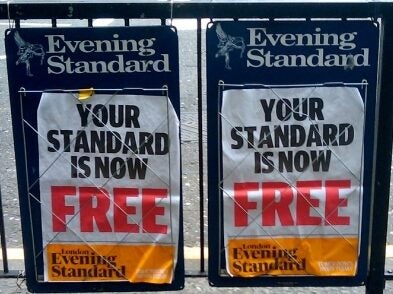
When Geordie Greig was made editor of the London Evening Standard just over three years ago he compared the task ahead for him and his team to climbing Everest without oxygen.
In the depths of the biggest media recession in history the paper was losing money at an annualised rate of £30m a year and by as much as 20 per cent a year.
In a city of eight million people the Standard was selling just 100,000 copies a day.
Clearly it wasn’t going to be enough to tweak the content or change the staff – what was needed was a game-changing gambit.
Three years after owners the Lebdedevs took the decision to take the Standard free, Greig’s successor Sarah Sands and her team are standing at the summit after completing one of the most remarkable comebacks in journalism history.
Managing director Andrew Mullins (pictured) revealed this week that in the year to the end of September the Standard made a trading profit of £1m (before exceptional items).
He and his team have achieved their stated aim of making it self-financing.
It is testament to the generosity of Alexander Lebedev and his son Evgeny that they do not expect to recoup the huge investment they have made in the Standard.
Apparently they are content now for the business to be stable and covering its own costs.
With a circulation of 700,000 a day the Standard has saturation coverage of London that no other title can claim The economics of the turnaround are fairly simple.

Distributing 100,000 copies a day was hugely expensive requiring the financing of vendors, distribution and marketing across thousands of outlets.
Today the Standard reaches the vast majority of its audience by dumping copies at drop-off points in around ten key transport termini.
According to Mullins there has not been a drastic reduction in editorial staff over the last three years.
Some journalists went as a result of the decision to move from two daily editions to one and 20 jobs went following the merger of The Independent and Standard business and sport desks in September of last year.
Asked what the prospects for the Standard were looking like before the Lebedevs acquired 75 per cent of the business from Daily Mail and General Trust three and a half years ago, Mullins says: “It was going to be shut down.”
Looking back to the period after the Lebedev purchase he says: “We knew that it was more than changing the editor, we needed to rethink the business model.”
Talking about the scale of the investment needed to go from paid-for to free, Mullins says: “It required a huge amount of cash. We were suddenly printing 600,000 copies but there were free or four months before the ad revenues
started coming in.
“[The Lebedevs] were prepared to believe in it, support it and bankroll it.”
It’s worth noting that the Standard has achieved its comeback despite newsprint costs rising rapidly in its first two years as a free title and the recession rumbling on far longer than had been anticipated.
Mullins says: “We wanted to be self-financing. A business that would fund its own existence.”
While £1m profit is a vast improvement, it is not the sort of number that less philanthropic owners would be happy with on a business which has a turnover somewhere approaching £100m.
The Standard’s best chance of improving its financial position in the future, according to Mullins, would come from winning the hotly contested local TV franchise for London and bringing in new advertisers to the brand.
Email pged@pressgazette.co.uk to point out mistakes, provide story tips or send in a letter for publication on our "Letters Page" blog

